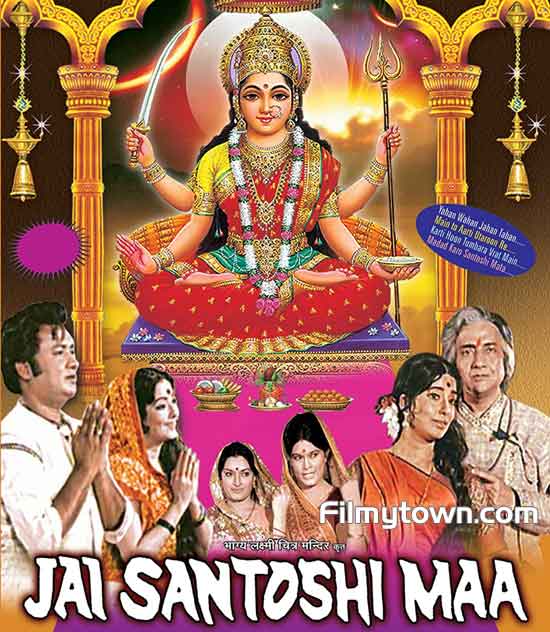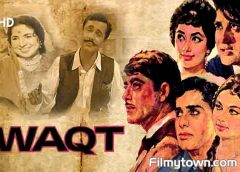The most successful film on mythology in India is Jai Santoshi Maa. This movie about an unknown Goddess till then brought about a revolution to the nation thirsting for and searching for hope in Emergency times. The mythological film Jai Santoshi Maa started a trend which was followed for years to come. During 1975 the film grossed over 5 Crore Rupees and in today’s value this amounts to Rs 200 Crores.
Jai Santoshi Maa is to be credited with the Friday fasts became a rage with almost every woman in India observing the fast. The offering of Jaggery and gram to the Goddess for 16 consecutive Fridays and break the fast was rampant all over the country. Rarely has any other movie caught the fancy of the populace like this movie. Not only did people follow the regimen but there were also myths that if the sequence is broken it will be a bad omen for the person observing the fast and so on. This movie created a revolution similar to what Ramayan and Mahabharat later did for televiewing. It was released on 30th May 1975.
Jai Santoshi Maa is a small budget movie with practically unknown star cast caught the imagination of our great nation and beheld it for a long time to come, it did roaring business at the box office and gave tough fight to main stream movies like Deewar and Sholay, also released the same year. This blockbuster made the makers quite wealthy.
The story is based on some religious books and folklore takes place on earth and heaven simultaneously. It starts with the birth of the Goddess Santoshi (Goddess of satisfaction) Lord Ganesha’s daughter and here on earth Satyavati Her biggest devotee who is happily married to the handsome Birju with the blessings of the Mother also the devotee of the Mother Goddess.
Birju the youngest of the seven brothers and an artist at heart he sings impromptu paeans for the Mother. The celestial saint Narad whips up passions within the minds of the wives of the great Trinity of Gods, Lakshmi, Parvati and Sarawati, he narrates to them the glory of Maa Santoshi saying that people on earth have strayed in their devotion and started praying to the new Goddess leaving the three. Showing overt jealousy and to test one of their own grand-daughter’s powers, they make life miserable for Satyavati through two of her scheming sisters-in law and by gossiping about her when they visit the house in disguise. Birju leaves behind Satyavati to earn wealth after a verbal altercation at home but news is spread that he has died while crossing the river. The sisters-in-law mistreat Satyavati and make her life hell to the extent that she even has to beg for her food to them but still keeps her faith in her Mother Goddess Santoshi, who saves her on every step, even making a personal appearances at times disguised as a saint.
Here Birju loses memory courtesy the trinity of devis and falls for a rich merchant’s daughter and yields a lot of wealth but as a closure is required thus as soon as Satyavati finishes her 16 fasts his memory returns and a celestial voice guide him to reach home asap. Loaded with wealth he comes back only to see his wife living in abject poverty in his own house, upset he builds a palatial home with a huge temple for the Mother, movie ends with the Mother giving ‘Darshan’ to her bhakts. All is well on earth and in heavens.
The movie unleashed such sentiments that people used to remove their footwear before entering the screening area out of respect, as soon as a song or aarti was sung on the screen people would shower flowers and coins on the screen.
The songs of the movie Jai Santoshi Maa, though not mainstream but devotional were very popular in any religious functions and used to play on loudspeakers in small towns and suburbs, specially ‘Main to aarti utarun re Jai Santoshi Maa ki’, ‘Madad karo he’ and ‘Jahan dekhun wahan wahan mat pooch kahan kahan’. Many temples were built in her name.
As it was a low budget offering most of the songs were sung by Usha Mangeshkar, younger sister of both Lata and Asha. Second only to Sholay in earnings that year. It was considered a surprise hit as the Indian film scenario was changing with more violence and the time of the ‘Angry young man’ prevalent during which such a mythological movie which had its story straight out of some Hindu religious psalmic books like Satyanarayan Katha and Ganesh Katha. Anita Guha the Hindi film heroine of the ’50s and ‘60s played title role and was literally prayed to with people even touching her feet in respect. Jai Santosi Maa…!!!
- Revisited by PAWAN GUPTA





